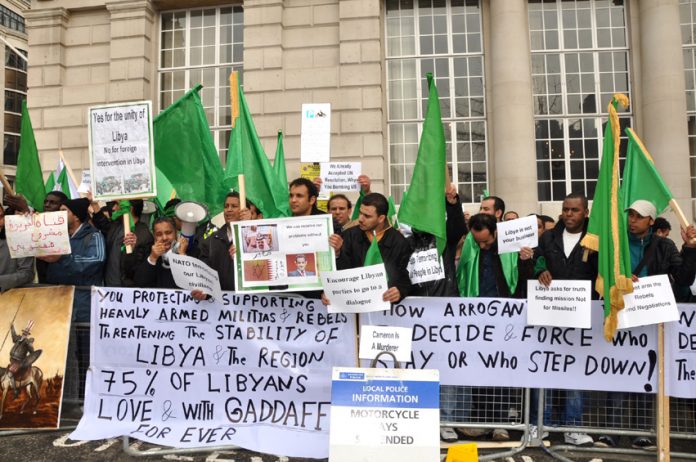The imperialist-backed Libyan National Transitional Council (NTC) ‘must act immediately to investigate and prosecute abuses against the Tawargha community of black Libyans’, said Amnesty International on Thursday.
This came after another Tawargha man was tortured to death in a Misratah detention centre.
The body of 44-year-old father-of-two, Barnous Bous’a, was delivered to his family on 16 April.
It was covered with bruises and cuts, including an open wound to the back of his head.
Barnous Bous’a was a civilian who had fled his home in Kararim in western Libya during last year’s armed conflict, settling in Sirte.
After his arrest by Misratah militias while fleeing further fighting in Sirte last October, he was reportedly held at a detention facility under the control of Misratah’s Security Committee, a committee created under the Misratah local council.
Amnesty has documented more than a dozen deaths in custody at the hands of armed militias since last September, amid widespread torture of suspected Gadaffi loyalists and soldiers.
A high proportion of the victims were Tawarghas.
Amnesty International Middle East and North Africa Deputy Director, Hassiba Hadj Sahraoui, said: ‘This brutal death highlights the continuing dangers to detainees in the new Libya.
‘How many more victims will die from torture until the authorities realise the gravity of the situation and deliver on their promises of investigating, prosecuting and putting an end to such crimes?
‘The leadership in Misratah is turning a blind eye to the mounting evidence of abuses committed at the hands of Misratah militias, arguing that only “individual mistakes” take place.
‘It is imperative that the NTC now reins in these militias, investigates all abuses and prosecutes those responsible, on all sides, in accordance with international law. Only then will Libya begin to turn the page on decades of systematic human rights violations.’
Amnesty added: ‘The entire population of the city of Tawargha, some 30,000 people, has suffered abuses at the hands of armed militias in revenge for their town’s perceived loyalty to the former government, and for crimes some Tawargha are accused of having committed during the siege and shelling of the neighbouring city of Misratah by Gadaffi forces.
‘Last August militias from Misratah drove out the entire population of Tawargha, looting and burning down their homes.
‘Since then, Misratah militias have been hunting down Tawarghas across Libya, snatching Tawargha men from camps for displaced people, homes, checkpoints and even hospitals.
‘Those abducted have been brought back to detention centres in Misratah where they are routinely tortured, in some cases to death.
‘Hundreds of Tawarghas are believed to be detained in Misratah with fresh arrests reported to Amnesty this week.
‘Meanwhile, at least two Tawargha men have been taken from Tripoli since 12 April: one was arrested shortly after he left a displaced person’s camp and the other was captured near his workplace.
‘Their relatives have not been able to locate their exact whereabouts but heard that both had been transferred to Misratah.
‘There they are at serious risk of torture and even death.’
One relative pleaded to Amnesty: ‘We are so afraid for the safety of all Tawarghas once they are taken to Misratah.
‘We cannot bear to hear more bad news . . . We are not safe anywhere, we can’t leave home, we are trapped.
‘If we go out, we risk arrest too. We can’t even leave and search for our relatives.’
Last Monday Misratah’s local leadership denied widespread reports of torture and other abuses committed by the city’s militias, while saying that ‘reconciliation between the two towns (Misratah and Tawargha) is probably impossible at the moment’ and that ‘some alternative solution for the Tawargha people’ is needed.
• Some 100 Tunisian workers kidnapped by armed men in western Libya have been released, Tunisia said last Wednesday after a diplomatic row in which the counter-revolutionary regime in Tripoli denied any abductions had occurred.
‘The Tunisians kidnapped in Libya have been freed,’ Tunisia’s interior ministry said in a statement which alleged that the workers’ seizure had been in retaliation for the arrest of Libyan nationals in Tunisia, and that Tunis had released three Libyans arrested on April 14 near the two North African countries’ border.
Tunisia’s interior ministry said the freed Libyans had already returned home, and that Tunis was working with authorities in Libya to assure the Tunisians’ safe return.
Tunisian media questioned officials’ handling of the incident.
News website Kapitalis asked: ‘If the hostage seizure took place, why do the Libyans deny it so categorically? And if it did not take place, why do the Tunisians say it did?’
The Tunisian League for Human Rights had said last Tuesday that around 100 people working near the town of Zaouia, some 50 kilometres (30 miles) west of Tripoli, had been taken hostage by armed men demanding the release of a group of Libyans held in Tunisia.
According to the rights group, the kidnappers’ leader was the brother of one of the arrested Libyans, who were suspected of drugs and arms trafficking.
But Libya’s interior ministry denied the incident, and the vice chairman of the Libyan NTC’s high security committee downplayed the event as a misunderstanding, claiming the Tunisians had merely had their journey interrupted by a group of former rebels angered by the detention of three Libyans in Tunis.
The Libyans ‘held up a group of Tunisians in a bid to have them join their cause,’ Tarek Zambo said.
‘This does not constitute a kidnapping,’ he claimed.
Zambo accused former members of murdered leader Muammar Gadaffi’s regime of provoking the unrest in hopes of ‘damaging relations’ between the two countries after finding refuge in southern Tunisia.
The border zone is plagued by violence and black-market trade and has seen a surge in arms trafficking since the NATO-backed Libyan ‘uprising’ that overthrew and brutally murdered Gadaffi in August last year.
Five Tunisian men were kidnapped in the same area on April 7th and let go two days later.
